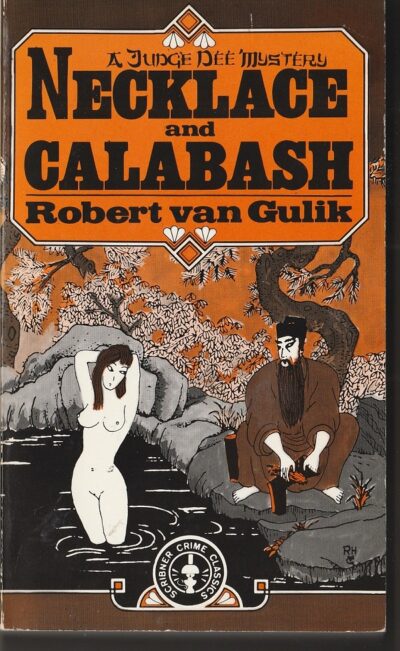In the opening scene of Robert van Gulik’s 1967 Judge Dee mystery Necklace and Calabash, the judge is on his way to a quick fishing vacation in Rivertown but has gotten lost in a forest.
Then, he sees a “hulking shape riding towards him on a horse that trod noiselessly on the soft moss,” seemingly his perfect double: “a man with a long beard and whiskers, wearing a square black cap and a black-bordered brown travelling-robe.” From his saddle hanging by a red-tasseled cord is a large brown calabash, like Judge Dee’s own.
The man is a vagrant Taoist monk, known as Master Gourd, and he carries a pair of crutches. He mistakes the judge for a doctor with medicine in his calabash. The judge asks what Master Gourd has in his:
“Emptiness, sir. Just emptiness. More valuable than any potion you might carry in yours, Doctor. No offence meant, of course. Emptiness is more important than fullness. You may choose the finest clay for making a beautiful jar, but without its emptiness that jar would be of no use. And however ornate you make a door or window, without their emptiness they could not be used.”
Nine hundred years earlier
 In 1841, Edgar Allan Poe published what is considered the first English-language detective fiction, the short story “The Murders in the Rue Morgue,” featuring C. Auguste Dupin as his investigator. But, for more than 900 years, the Chinese had been writing their own detective stories, known as gong’an, in which government officials solved crimes.
In 1841, Edgar Allan Poe published what is considered the first English-language detective fiction, the short story “The Murders in the Rue Morgue,” featuring C. Auguste Dupin as his investigator. But, for more than 900 years, the Chinese had been writing their own detective stories, known as gong’an, in which government officials solved crimes.
One such detective was Judge Dee, the central character in Di Gong An, a novel from the 1700s. He was based on an historical figure, Di Renjie, who lived in the seventh century during the Tang dynasty.
Early in World War II, van Gulik, a Dutch diplomat and an expert sinologist, found Di Gong An in a Tokyo bookstore and was so captivated that he translated the book into English and, after the war, published it as Celebrated Cases of Judge Dee.
He followed that up by writing his own Judge Dee stories, more than a dozen novels and short story collections. Since the 1960s, Judge Dee has also been the subject of a number of comic strips, movies, television series and other works, including, since 2000, more than two dozen books by authors writing in French, English and other languages.
Necklace and Calabash which came out in 1967, the year van Gulik died of cancer, was the last of his Judge Dee novels published in his lifetime. A final novel, Poets and Murder, was posthumously released a year later.
“Become the cashier”
In Necklace and Calabash, Judge Dee solves several mysteries, including the theft of a pearl necklace from the Third Princess, the lovely 25-year-old favorite daughter of the Emperor. That’s where the first half of the title comes from.
The second is from Master Gourd’s poetic description of the emptiness of a calabash and from the judge’s pondering that comment much later in the novel.
Judge Dee lifted the calabash and looked at it intently. He remembered what Master Gourd had said about the importance of being empty. In order to discover where Tai Min had hidden the necklace, he would have to empty himself, and put himself in the cashier’s place. Become the cashier of the Kingfisher, and live his life. The judge closed his eyes.
In this book as in the other Judge Dee novels, van Gulik avoids the supernatural elements that were usually part of the gong’an genre, and he westernizes his story enough that readers of such bestselling mystery writers as Agatha Christie and Dashiell Hammett will find it familiar in its rhythms of crime, clue, investigation and revelation.
Chinese culture and personality
The charm of van Gulik’s novels are the elements of Chinese culture and personality that he deftly weaves through the action. One example is the philosophizing of Master Gourd about the emptiness of the calabash.
Another is the eight illustrations that van Gulik drew in the Chinese style, such as one which shows Judge Dee meeting the Third Princess.
Later, another, rather racy illustration depicts a surprise that the judge gets from Fern, a housemaid at his inn who, knowing he has two wives already, is angling to become his third.
He turned round. Fern was standing naked in the knee-deep pool, drops of water glistening on her splendid young body. Her breathtaking beauty made the blood surge in his veins, touched his stimulated senses to the raw….[He] began to scrub his muddy boots with unnecessary vigor.
Patrick T. Reardon
4.3.24
Written by : Patrick T. Reardon
For more than three decades Patrick T. Reardon was an urban affairs writer, a feature writer, a columnist, and an editor for the Chicago Tribune. In 2000 he was one of a team of 50 staff members who won a Pulitzer Prize for explanatory reporting. Now a freelance writer and poet, he has contributed chapters to several books and is the author of Faith Stripped to Its Essence. His website is https://patricktreardon.com/.
